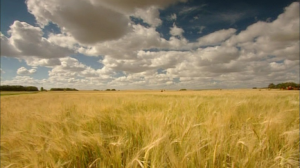
Modern agriculture involves the monoculture of a small number of crops, rather than a diversity of crop types.
© Lily Films 2009
Deborah Koons Garcia’s The Future of Food examines the recent Green Revolution, a dramatic change in production of food. Using interviews from people who have worked in corporations that deal with food, government officials, and farmers, as well as footage of working farms, the film illustrates the evolution, or degradation, of food production.
The Future of Food opens with a description of the Green Revolution, during which food production became more mechanized and the use of chemical fertilizers, insecticides, and fungicides increased the yield of common crops. Agriculture and biotechnology melded soon after, and genetic modification produced crops that were resistant to herbicides, pests, and had higher yields. At this point, however, the story reveals a darker reality of food production in North America. Large corporations began to apply for patents on their genetically modified organisms, claiming ownership over their strains of crop. Unfortunately, as seed spreads from one field to another by wind, insects, or other natural processes, patented plants grew, unbeknownst to the farmers, on neighboring fields. Corporations filed lawsuits against farmers, claiming that the farmers had stolen their plants. Koons uses interviews with farmers who have been taken to court by large agriculture corporations, such as Monsanto, to illustrate the changing field of modern food production. Many of her interviewees are female farmers who describe how their families and livelihoods have been affected by these lawsuits.
Koons then examines the potential health and environmental effects of genetically modified organisms. Allergic reactions as a result from taking genes from an allergenic food and inserting them into another food have been reported. Additionally, the effects of genetically modified plants reproducing and combining their genes with non-genetically modified plants have not been fully studied, and the potential consequences of hybrid plants have the potential to wreak havoc on small- scale subsistence farmers.
This film has a clear message, one that is distrustful of industry and big agriculture, and it questions the place of biotechnology in our food. However, the film ends on a positive note, describing the rise of the organic movement, farmers’ markets, and community-supported agriculture programs. Koons encourages viewers to use their consumer power to support local farms.
While there are not a lot of interviews coming from female experts, many personal anecdotes from women pertaining to how GMOs have resulted in an allergic reaction or how the Monsanto lawsuits have affected their lives are used in the documentary. Using these interviews alongside the interviews coming from men make the effects of GMO more personal because we see that this technology affects everyone associated with it.
This documentary received mixed reviews, with some calling it one-sided, without addressing oppositional views [1]. Others praised the documentary and used it as a rallying point to protest industrialized agriculture [2] [3].
For more information, visit http://www.thefutureoffood.com/.
[1] http://pubs.acs.org/cen/reelscience/reviews/future_food/
[2] http://www.sfgate.com/living/article/Fighting-for-the-future-of-food-Deborah-Koons-2637592.php
[3] http://movies.nytimes.com/2005/09/14/movies/14food.html?_r=0
